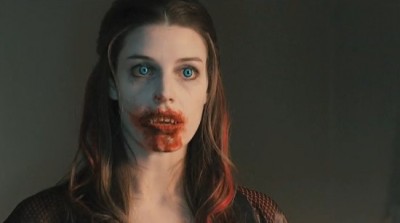LiveChat: Mad Men, s04e13, "Tomorrowland"

Don Draper's future wife is a vampire!
And with that, we end the fourth season of Mad Men, the best season in my estimation since the first - although I'm sure I said the same thing after the end of season three, also. I've got a longer, spoiler-heavy preamble than usual this week, so those who haven't seen the episode yet may want to head elsewhere for a little bit.
It seems there are quite a few people who were less than enamored with last night's episode. I suppose that's to be expected (this is what the internet does, after all). The complaint seems to be that Don's sudden proposal to Megan was out-of-character for him to the point of unbelievability and craziness. I disagree. Logan Hill of New York Magazine actually nailed my feelings on this so well that I will simply excerpt his recap:
In a way, Megan is an ad-man’s dream: She’s a cipher, an attractive brand with no history onto which he can project any dreamy vision of Tomorrowland that he wants (in the way the colonists once feminized the New World). Faye’s almost right that Don only likes beginnings. What he most likes are open-ended fantasies. Don sells dreams, and the beginning is when these fantasies are at their most pure because that’s when they’re completely unencumbered by reality. Megan’s Tomorrowland is just the latest escapist fantasy Don has conjured up over the years. He was about to escape with Miss Farrell before he left her idling in his car; he begged Rachel Mencken to run off with him and start a new life; he asked Midge to fly to Paris. Each of those fantasies was a ridiculous failure because he was married. But if he'd been single? Don's sudden proposal was shocking and strange, but it wasn't out of character.
Sounds about right to me. Another way to look at it (also touched on by Hill) would be the idea that Megan - someone who didn't know or care about his past - enabled Don to ignore all of his ideas about self-improvement and continue leaving Dick Whitman in the past. Also, I noted that Don was following the same mid-life crisis as Roger in season two (and Roger got a clever one-liner in there about exactly that), which to me suggested that the show was illustrating that, for all of Don's pretensions to the contrary, he's no different from anyone else: he, too, seeks only to act on his own impulsive desires.
I will, on the other hand, complain about Betty's arc for both this season and possibly for the entire series as a whole; it's not just that they've been turning her into a cartoonish, one-dimensional villain (and sorry to link to another New York piece), it's that they've been writing her with all the subtlety of a roundhouse kick to the solar plexus. The scene in which she curls up on Sally's bed was far too direct an illustration of an idea they had already drilled home multiple times this season - that Betty is an emotionally-stunted child in adult's clothing.
And there's still so much more to talk about, so we can do so below. This will mark the last of these; it's been a pleasure serving with you all.
















